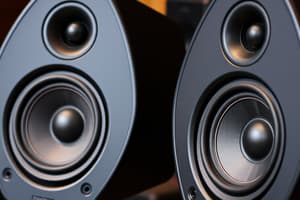Podcast
Questions and Answers
What is a good rule of thumb when placing your monitor speakers?
What is a good rule of thumb when placing your monitor speakers?
Monitor speakers should be positioned at an equilateral triangle with the listening position.
What happens if your monitor speakers are too close together?
What happens if your monitor speakers are too close together?
You may experience poor stereo imaging and a lack of clarity in the mix.
What happens when your monitor speakers are too far apart?
What happens when your monitor speakers are too far apart?
The sound may become disjointed, losing coherence and balance.
Why is it important to decouple the monitors from whatever they're sitting on?
Why is it important to decouple the monitors from whatever they're sitting on?
What are two ways to decouple a monitor?
What are two ways to decouple a monitor?
Why is it not recommended to mix at high volume levels?
Why is it not recommended to mix at high volume levels?
What are some reasons why mixing is done at low levels, or quietly?
What are some reasons why mixing is done at low levels, or quietly?
What are some reasons why you would want to listen to a mix in mono?
What are some reasons why you would want to listen to a mix in mono?
What is a reason you would want to listen to a mix on more than one speaker system?
What is a reason you would want to listen to a mix on more than one speaker system?
What are some things you can do to overcome potential acoustic problems in your listening environment?
What are some things you can do to overcome potential acoustic problems in your listening environment?
Why should you avoid placing monitor speakers directly against a wall?
Why should you avoid placing monitor speakers directly against a wall?
Flashcards are hidden until you start studying
Study Notes
Monitor Speaker Setup
- Place monitor speakers at ear level to ensure accurate sound representation.
- Set up monitors to form an equilateral triangle with the listening position for optimal sound.
Monitor Placement and Spacing
- Speakers too close together can cause phase issues, resulting in a less defined stereo image.
- Speakers too far apart can lead to a disjointed soundstage, making it difficult to pinpoint audio spatially.
Importance of Decoupling Monitors
- Decoupling monitors prevents vibrations from transferring to the surface they rest on, which can affect sound clarity.
Methods to Decouple Monitors
- Use isolation pads or stands to separate monitors from their surfaces, reducing resonance.
- Employ foam or elastic materials to absorb vibrations and improve audio fidelity.
Risks of Mixing at High Volume
- High volume levels can lead to ear fatigue, impairing judgment over time.
- Inaccurate mixing decisions are possible due to distorted sound perception at loud levels.
- Overemphasis on bass frequencies often occurs, causing an unbalanced mix.
- Potential damage to hearing might arise from prolonged exposure to high volumes.
Benefits of Mixing at Lower Levels
- Lower volumes help maintain a better frequency balance and dynamic range.
- Mixing quietly allows for more precise listening and critical ear adjustments.
- It reduces ear fatigue, promoting longer, more effective mixing sessions.
- Encourages reliance on the monitor's accuracy rather than volume.
Listening to Mixes in Mono
- Facilitates checking the mix's balance and compatibility across various playback systems.
- Identifies phase cancellation issues that may not be evident in stereo.
- Ensures all elements are audible, regardless of stereo imaging.
Listening on Multiple Speaker Systems
- Verifies that the mix translates well across different sound environments.
- Identifies potential flaws that may not be apparent on only one system.
Overcoming Acoustic Problems
- Use acoustic treatment, such as panels or bass traps, to improve the room's sound characteristics.
- Position monitors away from corners to minimize bass buildup and reflections.
Avoiding Wall Placement for Monitors
- Placing monitors against walls can cause bass reinforcement resulting in inaccurate low-frequency response.
- Reflections from walls can muddle the sound, making it difficult to assess the true mix.
Studying That Suits You
Use AI to generate personalized quizzes and flashcards to suit your learning preferences.




